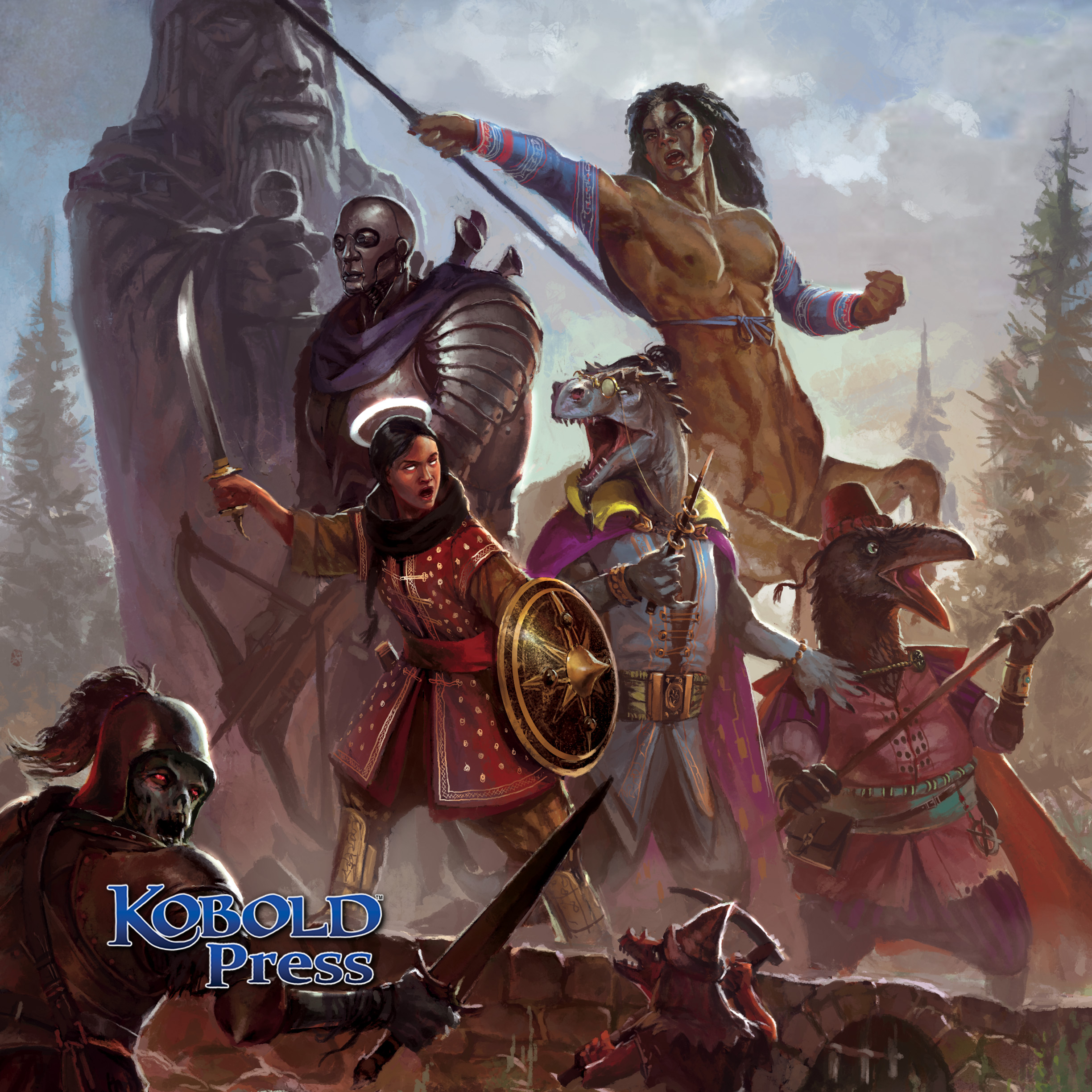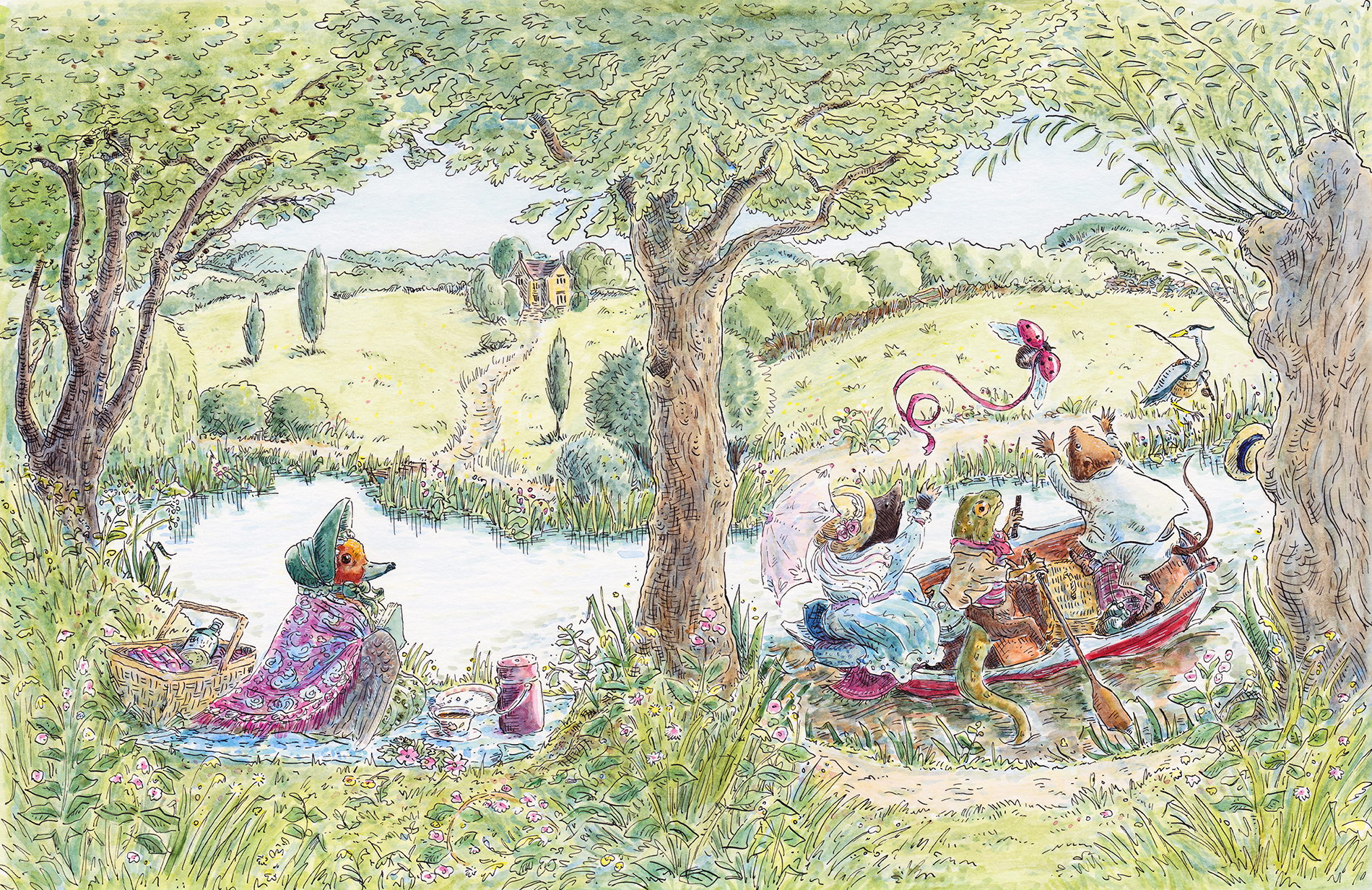
A big question in roleplaying as a hobby is, “How do I not just be me?” That’s kind of a trick question. You’re always you. You can’t not be.
But you can play with thinking like you’re not you. And you might surprise yourself by what you come up with when you’re playing.
Some people like to imagine their characters as whole, rounded people with thoughts and morals and drives, in the same way that an actor might prepare for a role. However, this isn’t the only way to approach it. Your character is not necessarily a whole, rounded person. A character is someone you create, and by necessity, it’s a subset of you.
So it’s OK for your character to be a little more 2D than you are. It might be better than OK. It might even be just the ticket.
The Old Margreve is now on sale in the Kobold Press store! Brace yourself for a legendary forest with a mind for adventure!
Find Your Character
One way to develop a character quickly is to find an archetype and use it to inform your decisions.
“Archetype” is a word that gets thrown around in roleplaying. This particular use of the word refers to Jungian archetypes, as defined by the Swiss psychologist, Carl Jung. He theorized that certain behavioral patterns keep occurring in humans, and he named twelve “original patterns” that humans keep coming up with. He eventually called them “archetypes.”
Jung believed that these archetypes, these patterns, occurred across places and eras. They keep happening, transcending an individual experience.
Note that for purposes of this article, a lot is being glossed over or ignored from Jung’s theories. There’s plenty of good takeaway without going all Psych 101 here.
Archetypes are not like star signs or personality types. You don’t necessarily find one and proclaim, “It me!” A real person will display all of these patterns at different times.
Characters, though? They can be more behaviorally shallow. You can pick one and let its pattern guide your character choices. If you wander out of it and start acting like a different archetype (or none of them), that’s fine too. People aren’t only one thing. But you can use an archetype’s wants and fears as a template of sorts, to behave in-character in a way that is different from how you’d normally react to circumstances.
The Archetypes
There are twelve agreed-upon archetypes. This article will look at six of them, and we’ll cover the other six next time. Each entry lists identifying wants and fears, and some notes about how to roleplay with them. Then each entry closes with a short list of classes that typically play into that archetype. Of course, any class can fit any archetype, but some are easier to imagine than others.
The Innocent
Wants: Happiness, freedom
Fears: Not fearful enough!
The Innocent doesn’t really fear anything, and that’s part of the bite of the archetype. An innocent wants to do things the right way and assumes that good intent and faith will solve the problems.
On the downside, the innocent is dependent on allies and is inclined to obey what they’re told by people they trust without questioning or trusting their own instincts. They tend to blame other people or “bad luck” for things that go wrong instead of taking responsibility for themselves.
Good classes: bard, cleric, druid, sorcerer
The Hero
Wants: Prove worth through courageous acts
Fears: Weakness, vulnerability
Every RPG adventurer wants to be the hero at some point. The hero displays courage and motivation to face fears and overcome challenges. A hero seeks competence and strives not just for victory, but to avoid losing.
When a hero archetype goes over the edge, they shy away from challenges, or self-sabotage with reckless behavior. They push beyond sense to “achieve,” while secretly working to fail.
Good classes: barbarian, fighter, mechanist, ranger, rogue
The Caregiver
Wants: Protect and care for others
Fears: Selfishness, ingratitude
The caregiver takes care of other people, protecting them from danger. A caregiver feels stronger than the people around them, and they like to give from that strength. They embody acceptance, protection, dedication, and perseverance.
When the shadow arrives, a caregiver turns manipulative. They feel exploited and martyred, and to receive their denied reward, they attempt to pry recognition out of people with guilt and shame, reminding them of the caregiver’s sacrifice.
Good classes: cleric, druid, fighter, monk, paladin
The Lover
Wants: Intimacy, connection
Fears: Loneliness, rejection
The lover loves loving and being loved. They emphasize beauty and whatever is pleasing to the senses. They pursue personal interests and seek to become attractive, both physically and emotionally. Loving themselves to make it easier to love others and be loved.
A lover fears rejection and pushes people away as a preemptive defense. They ask too much, feel restless, and become needy and lifeless. Personal interests become vices and addictions, in search of things that can bring the feelings back.
Good classes: barbarian, bard, druid, rogue, sorcerer
The Sage
Wants: To learn the truth
Fears: Being misled or ignorant
The sage is educated, knowledgeable, and wise. Sages tend to live in their heads and can be quiet and introspective. They want to understand the world around them and use their minds to do the analysis.
When good sages go bad, they’re critical and perfectionist. Nothing meets their ever-escalating high standards. In the worst case scenario, the sage is so detached that they miss the truth they yearn for.
Good classes: bard, mechanist, monk, warlock, wizard
The Ruler
Wants: Control and prosperity
Fears: Chaos, being overthrown
The ruler wants to exercise power and leadership. They don’t just want it done, the ruler wants to be the one to do it. When a ruler is on the rails, they’re stable and a solid role model for excellence.
When the ruler goes off the rails, they become tyrannical, ordering everyone around them to fulfill even unreasonable wishes. A bad ruler won’t delegate and can’t admit weakness. They exploit others to get what they want, and can go from hero to villain by seeking right ends with utterly wrong means.
Good classes: barbarian, mechanist, paladin, ranger, wizard
Do you see your current character in any of these? Try playing into it and seeing where it leads you!
It’s the lazy middle days of crowdfunding with RiverBank. Grab your friends for a waltz of whimsy, a hint of hilarity, and a dollop of drama.
See what all the pother is about!

